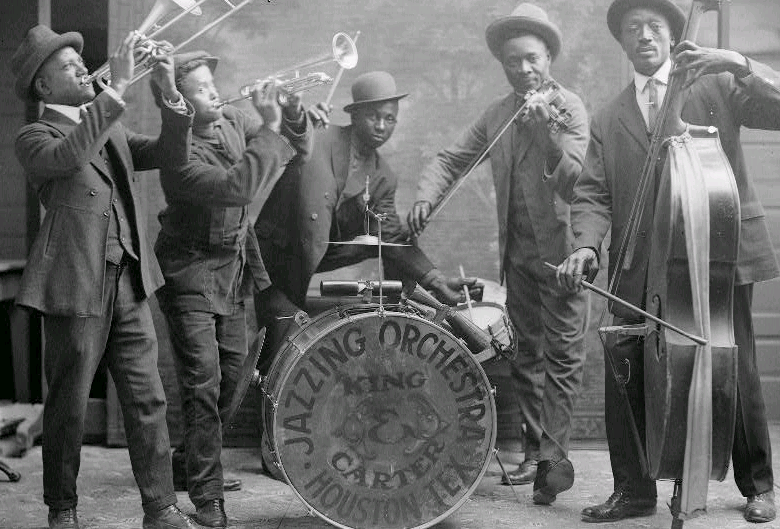Why learn about the Jazz Age?
Figure 1. Photograph of Carter And King Jazzing Orchestra a jazz quintet in Texas, 1921. Photograph by Robert Runyon, image courtesy Wikimedia Commons.
The Jazz Age, known as the Roaring Twenties, was an era of American history that began after World War I and ended with the start of the Great Depression in 1929. The popularity of the new jazz culture resulted in both positive and negative consequences within American society in the 1920s.
Jazz was an early bridge between the American mainstream and Black culture, it was the first time we see a minoritized group included in popular culture. Although White performers took over the music and navigated its spread within American society, the music was an early vehicle for the integration of some aspects of Black culture into White society. Jazz music represented a symbol of freedom in the form of lyrical prose and musical expression that quickly became popular among middle-class White Americans. Young people in the 1920s, captivated by jazz, were the first generation of teenagers and young adults to rebel against their parents’ traditional culture. The influence of jazz also positively impacted the women’s rights movement. As women gained the right to vote after World War I, they also achieved more social and financial freedom, which allowed some women to live more liberated lives that challenged traditional gender roles. Women were finally allowed to be free with their language, style of dress, and personal relationships. The shifting cultural landscape also allowed like-minded women to cultivate new forms of political solidarity.
This Jazz Age was also a period of upward mobility and increased acceptance for many Black Americans, though a White backlash to this disturbance of existing hierarchies soon followed. The Ku Klux Klan, founded in 1866 after the Civil War, grew to over four million members in the 1920s, and a number of other White supremacist groups formed during this time. The Klan’s movement railed against the “urban” popular culture captivating White youth as well as the growing wages of Black entertainers. The Klan created a nationwide campaign that called for society to “Americanize Americans”, proclaiming that Black persons, immigrants, Jews, and Catholics were not true Americans, and therefore were a problem that needed to be removed.
Think About It
As you read this module, keep in mind the question: how did the culture in America change during the Jazz Age?
